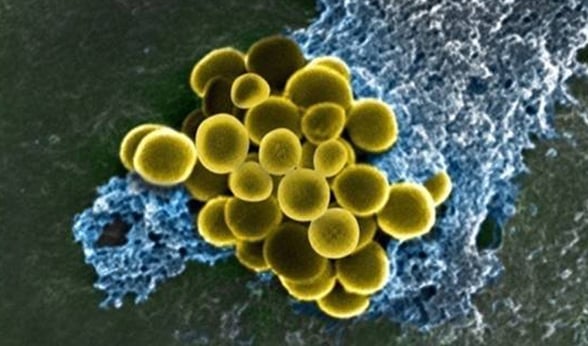The battle between good and evil is a theme usually reserved for blockbuster movies or literature. However, biomedical researcher Donald Leung, MD, PhD, is engaged in his own epic battle, pitting good bacteria against bad in order to treat atopic dermatitis or eczema – the world’s most common skin disease.

Donald Leung, MD, PhD
“The beneficial bacteria actually make natural antibiotics that kill staph aureus, the bad bacteria on the skin,” says Leung, medical director of the Clinical and Translational Research Center of the Colorado Clinical and Translational Sciences Institute (CCTSI) and head of the Division of Pediatric Allergy & Immunology at National Jewish Health. “We know that eczema patients don’t have the good bacteria on their skin that’s needed to kill staph aureus. Our research has also shown that their skin immune system is also ineffective at eradicating staph aureus, so there is a double whammy plaguing these patients.”
Leung has been studying – and treating – atopic dermatitis for 30 years. Twenty percent of children and 10 percent of adults have it. And without effective treatment options, patients may suffer a lifetime of painful, itchy and often infected skin. The majority of these patients develop a problem with staph infections and receive treatment with antibiotics. As a result, many patients develop antibiotic resistant bacteria on their skin, which can be very dangerous.
'Probiotic for the skin'
“Think of the good bacteria sort of like a probiotic for the skin,” says Leung. It may seem counterintuitive to apply bacteria to skin that is frequently plagued by bacterial infections, but the hope is that by applying good bacteria in a cream to eczema patients’ skin, a healthy bacterial balance will be restored.

Staph aureus
Researchers hope that using the microbiome cream will offer a long-term solution where other treatments fall short. Powerful antibiotics are commonly prescribed for eczema, but they kill good bacteria on patients’ skin along with the bad. Creams containing corticosteroids are also often prescribed to eczema patients, but they come with harsh side effects, and patients usually can’t tolerate using them for long periods of time.
Eliminating bad bacteria
In a study that is being led by Leung and Richard Gallo, MD, PhD, of University of California San Diego, patients apply the bacteria-infused cream twice a day. Researchers are then able to analyze patients’ skin DNA to see if the bad bacteria have been reduced. The goal is to eliminate the bad bacteria on the skin altogether. The cream helps to restore the natural balance of bacteria on the skin, which will help improve the skin barrier required to keep harmful bacteria out.
Leung says in addition to strengthening the skin by using the good bacteria to restore a healthy microbiome, the study could also ultimately help people with antibiotic resistant staph infections such as MRSA who are running out of treatment options. For more information on how to participate in this study, or other eczema-related research at National Jewish Health, contact Sussmanj@njhealth.org.
Guest contributor: Wendy Meyer, director of communications and marketing, CCTSI.




